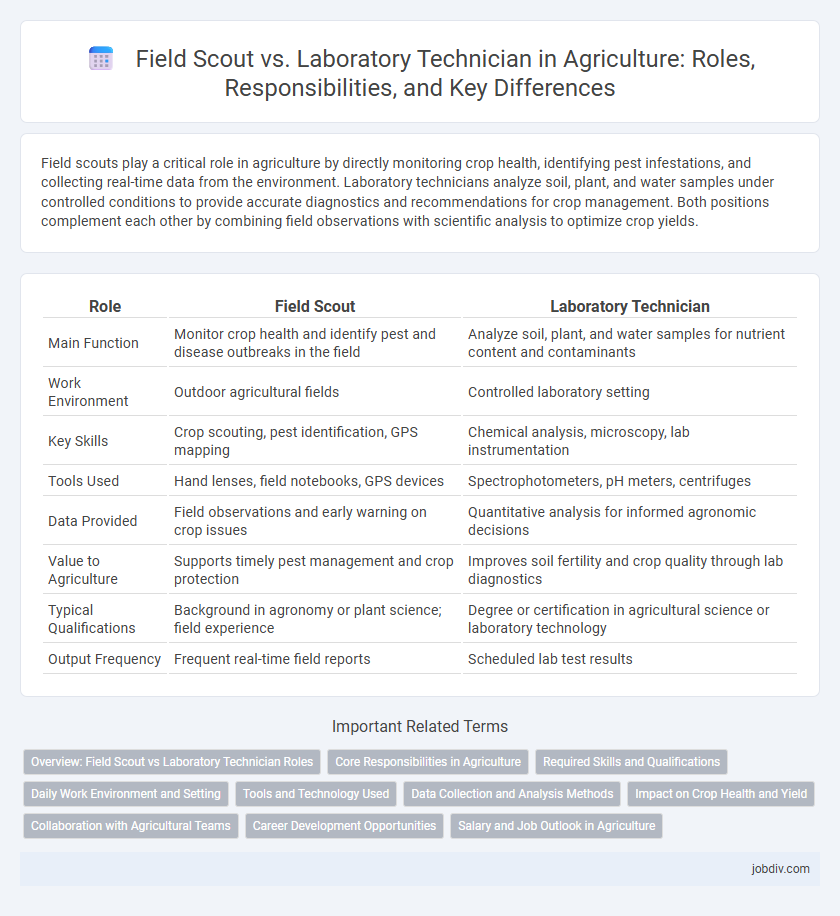Field scouts play a critical role in agriculture by directly monitoring crop health, identifying pest infestations, and collecting real-time data from the environment. Laboratory technicians analyze soil, plant, and water samples under controlled conditions to provide accurate diagnostics and recommendations for crop management. Both positions complement each other by combining field observations with scientific analysis to optimize crop yields.
Table of Comparison
| Role | Field Scout | Laboratory Technician |
|---|---|---|
| Main Function | Monitor crop health and identify pest and disease outbreaks in the field | Analyze soil, plant, and water samples for nutrient content and contaminants |
| Work Environment | Outdoor agricultural fields | Controlled laboratory setting |
| Key Skills | Crop scouting, pest identification, GPS mapping | Chemical analysis, microscopy, lab instrumentation |
| Tools Used | Hand lenses, field notebooks, GPS devices | Spectrophotometers, pH meters, centrifuges |
| Data Provided | Field observations and early warning on crop issues | Quantitative analysis for informed agronomic decisions |
| Value to Agriculture | Supports timely pest management and crop protection | Improves soil fertility and crop quality through lab diagnostics |
| Typical Qualifications | Background in agronomy or plant science; field experience | Degree or certification in agricultural science or laboratory technology |
| Output Frequency | Frequent real-time field reports | Scheduled lab test results |
Overview: Field Scout vs Laboratory Technician Roles
Field Scouts gather real-time crop and pest data directly from agricultural sites, enabling immediate assessment of crop health and pest infestations through visual inspection and sampling. Laboratory Technicians analyze collected samples under controlled conditions, conducting tests such as soil nutrient analysis, pest identification, and plant disease diagnostics to provide precise and detailed information. Together, these roles complement each other by combining on-site observational data with scientific laboratory analysis to support effective crop management and decision-making.
Core Responsibilities in Agriculture
Field Scouts monitor crop health and pest activity directly in agricultural environments, collecting real-time data on plant conditions and pest infestations to inform immediate management decisions. Laboratory Technicians analyze soil, plant tissue, and pest samples under controlled conditions, providing precise diagnostic results that guide long-term crop management strategies. Both roles collaborate to optimize crop yield and protect against diseases through integrated pest management and soil fertility assessment.
Required Skills and Qualifications
Field Scouts require strong observational skills, knowledge of crop cycles, pest identification, and proficiency in using GPS and field data collection tools. Laboratory Technicians need expertise in sample preparation, chemical analysis, laboratory equipment operation, and a background in biology or chemistry. Both roles demand attention to detail, problem-solving abilities, and familiarity with agricultural research protocols.
Daily Work Environment and Setting
Field Scouts primarily work outdoors in varied agricultural environments, including crop fields, orchards, and greenhouses, conducting pest monitoring, crop health assessments, and environmental data collection. Laboratory Technicians operate within controlled indoor settings such as agricultural labs, where they analyze soil, plant, and pest samples using specialized instruments to support agricultural research and disease diagnosis. The daily work environment for Field Scouts is dynamic and exposed to weather conditions, while Laboratory Technicians maintain a consistent, sterile workspace focused on precision and sample processing.
Tools and Technology Used
Field Scouts utilize handheld GPS devices, mobile apps for real-time crop health monitoring, and drones equipped with multispectral sensors to assess field conditions directly. Laboratory Technicians rely on advanced analytical instruments like spectrophotometers, chromatographs, and microscopes to examine soil, water, and plant samples for nutrient content, pathogens, and chemical residues. Both roles incorporate data management software, but Field Scouts emphasize field-based mobile technology, whereas Laboratory Technicians focus on precise laboratory equipment for detailed analyses.
Data Collection and Analysis Methods
Field Scouts in agriculture emphasize real-time, on-site data collection using mobile devices, drones, and visual inspections to monitor crop health, pest presence, and environmental conditions. Laboratory Technicians analyze collected samples through controlled experiments, biochemical assays, and microscopy to provide detailed nutrient, soil, and pathogen profiles. Combining in-field observational data with lab-based analytical results enhances decision-making accuracy for crop management and yield optimization.
Impact on Crop Health and Yield
Field Scouts directly monitor crop conditions and pest pressures in real-time, enabling immediate interventions that prevent extensive damage and optimize yield potential. Laboratory Technicians analyze soil, plant tissues, and pest samples to provide accurate diagnostic data, informing precise treatment strategies that enhance crop health systematically. Together, their roles integrate field observations with scientific analysis, maximizing crop productivity and sustainable agricultural outcomes.
Collaboration with Agricultural Teams
Field Scouts provide real-time data on crop health and pest infestations directly from the field, enabling immediate decision-making for agricultural teams. Laboratory Technicians analyze soil, plant, and water samples in controlled environments to validate field observations and support accurate diagnosis. Their collaboration ensures integrated pest management strategies and optimized crop production through data-driven insights.
Career Development Opportunities
Field Scouts gain hands-on experience in crop monitoring and pest identification, enabling rapid advancement into agronomy or crop management roles. Laboratory Technicians develop expertise in soil analysis, plant pathology, and quality control, paving the way for specialization in agricultural research or biotechnology. Both careers offer pathways to managerial positions, but Field Scouts often transition faster into field leadership, while Laboratory Technicians may progress towards scientific or regulatory roles.
Salary and Job Outlook in Agriculture
Field Scouts in agriculture typically earn an average annual salary ranging from $30,000 to $45,000, with opportunities for growth based on experience and region. Laboratory Technicians, specializing in agricultural testing and analysis, command higher salaries, generally between $40,000 and $60,000 per year, reflecting their technical expertise. Job outlook for Field Scouts remains steady due to ongoing demand for crop monitoring, while Laboratory Technicians experience stronger growth driven by advancements in agricultural biotechnology and research.
Field Scout vs Laboratory Technician Infographic

 jobdiv.com
jobdiv.com